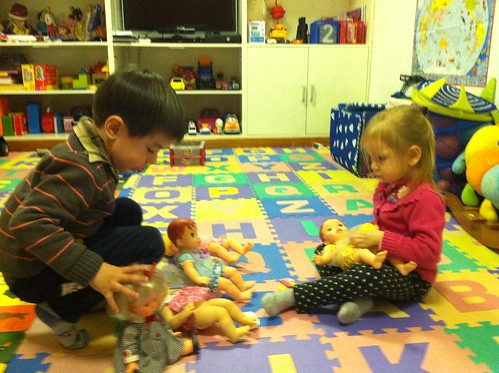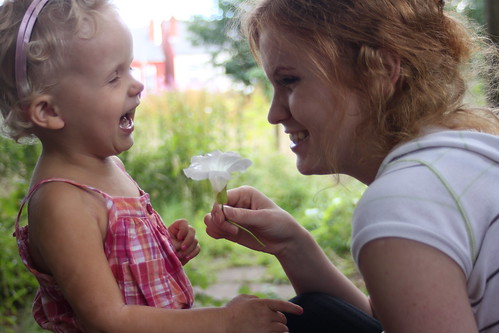|
Tired of shouting up the stairs to a child who is watching TV instead of cleaning their room? There’s a better way. Learn why this scenario rarely gets positive results and how to get your kids to clean their rooms.
Yelling will likely not resolve too many problems. Sometimes, it can work for the moment, but it also can worsen the issue in the future. Instead, try a little creativity and consistency. Creativity Creativity, in combination with consistency, can play an important role in getting kids to do tasks such cleaning their rooms. Who says chores have to be boring? Why not make them fun? For preschoolers and toddlers, try having races to the toy box. If a toy grocery cart or wagon is available, the children can pick up more toys at once. Racing with the cart or wagon can be fun. With older kids you may have to try something else. Often, the reason behind older kids not cleaning is because there is not an exact place for everything. Try taking the kids each on their own separate shopping trip. Allow them to pick out organizational items for their room. To make it more fun, allow them to personalize those items with paint or fabric. Think about your child's favorite activity and try to incorporate that in cleaning the room. For instance, if your kids enjoy dancing, you can turn on the music. To get your kids to clean their rooms let them know they can dance while cleaning. Creative ideas do not have to be limited to those above. They may even need to be updated periodically as your kids get bored. Sometimes all that is needed to motivate kids to clean their rooms is a fresh idea that hasn't been used before. Also, this could act as an opportunity for creative play with your child. According to the American Academy of Pediatrics, creative play is essential. Consistency If you have instructed your kids to clean their rooms, you must show them you are serious about it, even if it’s fun. Stay in close proximity to the rooms until they are clean and keep finding more fun ways to get the job done so they don’t get bored or lose sight of the task at hand. It is possible to be fun and serious at the same time. When you are trying to get the kids to clean their rooms with fun and creativity, it should be evident that whether they choose to have fun with it or not, their rooms still need to be cleaned. But make sure it’s their choice. This teaches more responsibility. When combining creativity and consistency, the kids should easily understand that their room is going to get cleaned. More On Cleaning With Kids: Upstream Parenting: What To Do When Young Kids Won't Clean Why is My Child's Room So Messy?
2 Comments
"Julie! I told you to pick up those toys an hour ago. Why are they still there?" If you have young kids and this sounds familiar, all you need is a bit of routine and a dose of fun. As a long-time parent, I know full well that not all kids enjoy cleaning. Some see cleaning as a source of enjoyment. But if that's not your child, you are not alone. When young kids won't clean, it may be time for a new plan. Here are some of the things I have found effective over the years.
Make a chore chart. This helps with organization and also serves as a good reminder and source of motivation. For young kids who can't read, use pictures to depict each chore, rather than words. This way, your child can translate the chart without assistance. Young kids often thrive on independence. At least, that's how all of my kids were when they were small. Therefore, a chore chart they can use without the help of a parent may yield the best results. It also sets the pattern for kids to become responsible for their own actions. Offer incentive. It's not fair to expect the kids to complete tasks without some kind of incentive. While teaching kids to do some things without being compensated is good, when it comes to chores, I prefer to reward my kids when possible. I leave learning about being unselfish to things like helping others without being asked. We have an elaborate chore chart system that also combines allowance earnings. You may choose to develop another system. Good incentive for young kids could be anything from money to special healthy treats, stickers, and more. Make it fun. Young kids may not always enjoy cleaning. But they may not think of it as a chore if you make it something fun. We like to dance while cleaning or have cleanup and put away races. Making games out of cleaning up can reduce the grueling effect cleaning up may have on some kids. There's no reason not to make it an enjoyable experience for them and it may set a life pattern of seeing the fun in everything. Get organized. Sometimes young kids don't clean up because there is no exact place for each item. If there's nowhere obvious to store their items, young kids will be happy with them being on the floor. After all, they can see all their toys that way. Devising an organizational plan that still allows the kids to easily see and grab their items has always helped in our family. Don't stress. It's easy to panic when your child has thrown everything she owns onto the floor and refuses to pick it up. But as the parent, you should be the calm voice of reason and understanding. Remember that while it can be frustrating, it can be turned around with a little effort. At the end of the day, it is just a mess and not the end of the world. It will get cleaned up when you instruct your child on cleaning and instill some sort of routine. Be consistent. This is the most important part of any routine you decide to go with. As long as you stick to what is relayed to your child, it will get done. My kids have always been better at cleaning when I make sure they clearly follow my instructions and the routine I lay out. You can't tell them something one day and ignore it or say something else the next. Otherwise, all that happens is they get confused and the room doesn't get clean. More from Lyn: Why is My Child's Room so Messy? Can a House with Kids Be Too Clean? 5 Must-Have Items for Organizing a Kid’s Bedroom "But if we move, how can I see my friends?" "That's a really long way away from Granny's house. When do I get to see her?" These are some of the questions kids may ask when moving. They will likely be dealing with many difficult transitions. As a parent who has dealt with this type of scenario more than once, here are some of my best positive parenting methods for helping kids transition during a move.
Be quiet and listen. Before explaining a multitude of things about your move, listen to how your child is feeling. Take him for a walk or relax in the backyard and just let him say what he feels. Sometimes just letting everything out, knowing someone hears you, is helpful. This also gives you some insight into what is needed to help him feel better. It's easier for kids to transition when they know they are heard and that their concerns matter. Find solutions for keeping in touch with friends and relatives. If you're only moving across town, it should still be relatively easy to keep up with friends and relatives that once lived nearby. But if your child will need to leave them in another state or country, alternative solutions will be needed. Email, Facebook, a cell phone, or messenger apps are just some of the ways to keep in touch. Be creative and figure out what works for your child, depending on age and preferences. It's easier to transition to a move when familiar people aren't out of reach. Be sure the child knows the reasons for moving. Even if they don't express it, children might feel like a move is their fault. This can especially be true if the move is due to divorce or similar situations. Make the transition more smooth by explaining to your children the reasons for the move. Make sure they know that the move is not their fault. Remain positive about the move. Regardless of the reason for moving, keep it positive. Represent the good aspects of moving to your child. It's alright to discuss some of the things the family doesn't like about moving. But don't forget to also talk about the good things. Are you closer to a nice, new school? Closer to family? Maybe there is an area attraction the kids would enjoy. It's easier to transition when the good things about it are made obvious. Be understanding. Sometimes no matter what you say or do, a child is going to be unhappy about the move, at least at first. Lend an ear and an open mind and heart. Even if it isn't possible to go back to the way things were before, your child needs to know that you understand his feelings. You can tell him your concerns as well and how you are dealing with them. You can also just be a shoulder and source of comfort. In time, your child will very likely transition to the move and before you know it, he'll have new friends to hang out with. The important thing is that you be there for him until he does. *I originally published a version of this via Yahoo Contributor Network Positive Parenting Tips: How to Show Kids They Matter
For whatever reason, kids can often feel as though they are the odd one out - that no one understands them. You know full well that your kids matter. Show them just how much with some positive parenting. Most parents do care and want their kids to know that, but some just aren't sure how to put feelings into action.
Give them choices. Although you may want everything to go a certain way, kids should be a part of family decisions, too. Sometimes - maybe many times - not everyone is going to agree on things. Let the kids decide what to do whenever possible. This shows them their thoughts matter to you. When kids know they matter, they may be more inclined to respect your wishes for decisions you must make. Respect their opinions. Even when their opinions differ from yours - and they will sometimes - respect what your kids think. Things don't always have to go their way. But let them be individuals. Sooner or later your child is going to grow up. He needs to know his voice matters to be respected in the world outside your home. Even inside the home, your child's opinions and insight should count. Give them freedom. There are limits to this for safety reasons, of course. But give your kids some freedom. They don't need to be right next to you at every moment. Trust them to do age-appropriate tasks without your assistance. It can be a parental instinct to be a mother hen or a father lion. That's part of being a parent, but if we don't let them do some things for themselves, they will never learn. Let them teach you about their favorite things. You may be old and wise, but kids have so much to teach us adults. Listen. Let your child know that her interests are important to you. Sometimes what kids are interested in don't line up with those of their parents. Still, you need to be supportive of your child's individuality. Don't try to force your interests on him and don't attempt to keep him from his unless they are harmful in nature. Show affection even when they misbehave. Even when kids misbehave, they still deserve your love. Discipline must take place. But that doesn't mean a hug isn't in order. In fact, that may be exactly what the doctor has ordered. Show your child his feelings matter to you by still showing affection, even in difficult times. *I originally published this via Yahoo Contributor Network Positive Parenting Tips: Keeping Kids Motivated Positive parenting is about looking for results that have a lasting positive effect on your child. Keeping a child motivated can sometimes be difficult. This is especially true when they start seeing evidence that not all things will work out as planned. As a parent, your job is to keep them motivated and inspired to do good things even when the outlook doesn't seem to match what they want.
Keep a goal chart. Make a goal chart so that kids can keep track of their goals, dreams, and accomplishments. These can be a good mix between small and large goals. Blending them together helps kids see that some things can be accomplished quickly and easily, while others may take more time and effort. If you only track large goals, that could discourage some kids when they see how long it's taking. On the flip side, if you only track smaller, simple goals, they may think everything in life is easy, which could backfire when there are certain things they cannot have or do right away. Cheer them on. When watching your kids achieve goals, milestones, and achievements, don't forget to cheer them on. This is true with the items on the chart and just everyday achievements. It can be easy to just shirk off the simple things after a child tells you about the same or similar things every day. But, if your child is excited about something, big or small, cheer her on anyway. Don't dwell on failures. It's only natural that your child will not succeed at everything. Don't focus on these things. It's alright to offer encouragement for your child to try again. But don't focus overly on the negative aspects of failure. Instead, find the positive things that occurred in the process of trying to obtain goals. Let them know they motivate you. Most parents get inspired by their kids often. But how often do we let them know how they make us feel? We might tell them we love them. But when your kids inspire you to do something, do you tell them you are doing it because of them? Doing so lets them know they have the ability to do great things. Foster what excites them. Does your child get especially excited over something in particular? Harbor that interest. If it's dance, get him in dance classes and offer gentle - not pushy - encouragement and guidance. If it's medicine, take her to medical museums, buy books, and register her for age-appropriate classes. Fostering and encouraging their natural interests, without pushing them or expecting too much, helps children develop self-confidence. This motivates them to be the best they can be as individuals. *I originally published this via Yahoo Contributor Network |
Instant Download On Order
Categories
All
Archives
May 2024
|
- Brand Shamans
- Brand Healing
- Inner Healing
-
INTENT-SIVE NATURE
- Content & Brand Elevation
- Healing Jewelry & Talismans
- Bath, Beauty, & Self-Care
- Healing Sessions
- Rituals, Herbs, & Altar Supplies
- Gawwwdess Baby Boutique
- Soul Flame Gifts
- Yoga & Meditation
- Books & Media
- Education & Homeschool Resources
- Home, RV, & Decor
- Clothing
- Pets
- Custom Orders
- Monthly Subscription Boxes
- October Festivals
- FLOW-Key Parenting
- About & Contact
- RV, Nature, & Travel Shamans
- Souls Within
- Life & Home
- Heart 'N Mind Homeschool
- The Homeschooling Mommy
- Books & Authors
- Speak Up!
- Pawsitive Pet Parenting
- Manifesterz
- Gifts In Minutes
- Brand Shamans
- Brand Healing
- Inner Healing
-
INTENT-SIVE NATURE
- Content & Brand Elevation
- Healing Jewelry & Talismans
- Bath, Beauty, & Self-Care
- Healing Sessions
- Rituals, Herbs, & Altar Supplies
- Gawwwdess Baby Boutique
- Soul Flame Gifts
- Yoga & Meditation
- Books & Media
- Education & Homeschool Resources
- Home, RV, & Decor
- Clothing
- Pets
- Custom Orders
- Monthly Subscription Boxes
- October Festivals
- FLOW-Key Parenting
- About & Contact
- RV, Nature, & Travel Shamans
- Souls Within
- Life & Home
- Heart 'N Mind Homeschool
- The Homeschooling Mommy
- Books & Authors
- Speak Up!
- Pawsitive Pet Parenting
- Manifesterz
- Gifts In Minutes






 RSS Feed
RSS Feed





